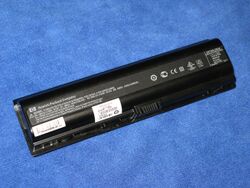Engineering:Smart Battery


A smart battery or a smart battery pack is a rechargeable battery pack with a built-in battery management system (BMS), usually designed for use in a portable computer such as a laptop. In addition to the usual positive and negative terminals, a smart battery has two or more terminals to connect to the BMS; typically the negative terminal is also used as BMS "ground". BMS interface examples are: SMBus, PMBus, EIA-232, EIA-485,[1] and Local Interconnect Network.
Internally, a smart battery can measure voltage and current, and deduce charge level and SoH (State of Health) parameters, indicating the state of the cells. Externally, a smart battery can communicate with a smart battery charger and a "smart energy user" via the bus interface. A smart battery can demand that the charging stop, request charging, or demand that the smart energy user stop using power from this battery. There are standard specifications for smart batteries: Smart Battery System[2], MIPI BIF and many ad-hoc specifications.
See also
- Battery charger
- CMOS battery
- Rechargeable battery
References
External links
- "Smart Battery System Specifications". http://sbs-forum.org/specs/sbdat110.pdf.
- BMZ GmbH (Home page of system provider and specialist for smart battery solutions)
- "How to monitor smart battery over its power line". http://yamar.com/articles/Battery-monitoring-system-with-powerline-communication.pdf.
